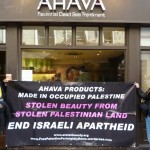
The central London branch of Israeli settlement company Ahava was occupied by Pro-Palestine activists from 11.30am until 3pm today, shutting the shop for business for entire time. Two activists managed to bring a concrete slab with tubing going through the middle into the shop and lock their arms together inside it, thus blockading the shop. The shop assistant attempted to remove them from the shop but gave up when she realised they had locked their arms inside.
The police arrived on the scene after 15 minutes and moved supporters carrying a banner outside the shop, where they proceeded to engage with a generally supportive public about the Palestinian issue and the nature of Ahava’s business.
Instead of waiting for the trained lock on cutting team, at 2pm the police began to dismantle the lock on themselves with a hammer, risking injury to the activists whose arms were locked inside. Luckily no one was hurt and by 2.30pm they had removed the activists from the lock on and arrested them activists for aggravated trespass; committing trespass with the intent to stop a lawful activity. The aggravated trespass charge will of course be challenged by asserting that Ahava’s business is not lawful and so no lawful activity was halted.
When action supporters left the scene at 3pm the store was still closed, brining the total closure time to at least 3.5 hours, over half of the trading time on the day on which Ahava generally receives the most business, Saturday.
